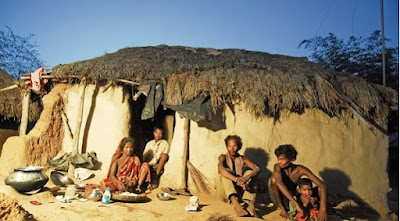Whose India?
The Sangh Parivar and the corporate
clique that supports them are celebrating the Amrit Mahotsav of India’s
independence. Their India has reasons to celebrate. Two of them have entered
into the top ten of the Forbes list of the richest people in the world. Adani
has climbed over Ambani to occupy the third place while the latter is in the
eighth place. Gautam Adani’s economic growth has been nothing less than
fabulous after Narendra Modi became India’s Prime Minister. His brother, Vinod,
has also emerged as superrich with a wealth of Rs1.69 lakh crore. IMF has
declared that Indian economy has beaten the British economy to emerge as the
fifth strongest economy in the world. At this rate, India is going to push Germany
and Japan behind by 2030 to become the third largest economy in the world.
Great. But who benefits? That’s a pertinent question.
There is a
dark, very dark, side to this economic growth. In the global hunger index,
India is slipping down pathetically. Out
of 116 countries, India’s place is a wretched 101. We are on a par with
starving countries like Somalia now. Most other countries of South Asia are
faring much better than India in this regard. The 2022 national survey on
family health [NFHS-5]
reveals the startling fact that 67% of the country’s children below the age of 5,
58.6% of the women in the reproductive age group, and 25% of the men between
the ages of 15 and 49 are suffering from anemia. The country’s economy is
healthy but not the citizens.
In human
resources development index, India stands at 161 out of 191 nations. That is
far below countries like Bangladesh and Bhutan. The Covid pandemic stole the
lives of about 47 lakh Indians, according to the WHO. That is one-third of the
world’s total number of Covid deaths. Nothing to be proud of in the health
sector. The Indian government’s thoughtless policies and actions with respect
to the pandemic (such as the instant lockdown) led to the catastrophic
situations. The state where the largest number of children died in those days due
to lack of oxygen supply in hospitals is now spending crores of rupees to advertise
itself as the shining beacon of the country. The people of that state could not
even afford to bury their dead and hundreds of corpses floated down the holy
river of Ganga.
84% of
Indians saw their wealth fall in the post-pandemic situation. But at the same
time the number of Indian dollar-billionaires rose from 102 to 142. Many of
these billionaires cashed in on the misery of their compatriots with the
support of the government. It is estimated that Covid-related industries helped
these people to raise their asset to Rs 6 lakh crore.
The Modi
government has taken Indian economy forward by leaps and bounds. But who benefitted by
that growth? That is the question. Not the majority of the people of the
country. But a tiny minority. The corporate sector. This corporate sector has
paid back to the BJP a share of their profit and the party has become one of
the richest political parties in the world today.
The corporate
sector will continue to flourish in India as long as Modi continues as the PM.
Their taxes were reduced from 30% to 22% while the common man’s taxes were
hiked every now and then though indirectly. The loans taken by the most affluent
are written off in Modi’s India while the poor are driven to suicide because of
their inability to pay back the loans. Modi has written off big corporate loans
amounting to Rs10 lakh crore. The ordinary Indian will pay back all that in the
form of various taxes and cess and so on.
In the
meanwhile, Modi continues to sell the country to the corporate sector. Banks
and insurance and transport systems and forests and industries are all becoming
private properties.
Even more
tragic is what has been done to academics, judiciary and other institutions
which should have remained above politics. They have all been corrupted by the
Sangh Parivar. History is fabricated now and justice is ravaged. And Modi
continues to be a national hero. Which means there is little hope ahead.

Hari OM
ReplyDeleteDour reading... and as the spectre of similar 'growth obsession' rises here, I see how it is that these...... let's call them ultra-Conservatives rather than the F-word..... plot their way to a true and disproportionate divide between the haves and have-nots. YAM xx
The Public Distribution System seems to be collapsing too. Much of what was given earlier has been stopped. The poor are going to face worse days, I feel.
DeleteMegalomaniacs!
ReplyDeleteExactly. And they think Indians are beggars.
DeleteVery informative, thanks for posting such informative content. Expecting more from you.
ReplyDeleteMost Trusted Mumbai Matrimony Services